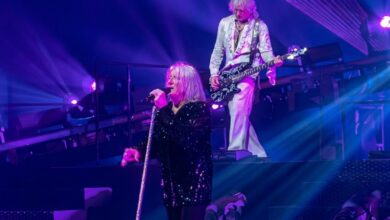His Voice Held Pain; He Left Two Months Later, Still A Lion, Though Frail
Johnny Cash’s final live performance, held on July 5, 2003, at the Carter Family Fold in Hiltons, Virginia, remains a powerful tribute to his extraordinary legacy as one of the most revered figures in American music history. At this late stage in his life, Cash was contending with significant health issues, including severe vision impairment and physical frailty, which were compounded by the recent death of his beloved wife, June Carter Cash. Despite these challenges, his performance was marked by a resilience and dedication that deeply moved those in attendance.
The concert opened with Cash’s familiar, unassuming greeting, “Hello, I’m Johnny Cash,” setting a tone of intimate familiarity that characterized the evening. He was accompanied by a small ensemble featuring his son, John Carter Cash, on vocals, along with Jerry Hensley on guitar and Bobby Starnes on bass. The setlist was a poignant collection of Cash’s most beloved songs, including classics like “Folsom Prison Blues,” “I Walk the Line,” “Ring of Fire,” and “Big River.” Kris Kristofferson’s reflective “Sunday Mornin’ Comin’ Down” was also featured, showcasing Cash’s ability to interpret other artists’ work with his signature depth.
A particularly emotional moment came when Cash performed “Angel Band,” a song previously sung by Emmylou Harris at June Carter Cash’s funeral. This performance was a deeply personal tribute to his late wife, highlighting the profound grief Cash was enduring while honoring the significant role she had played in his life. Another notable moment was Cash’s rendition of “Understand Your Man,” a song he had not performed in over twenty years. Its inclusion added a layer of nostalgia to the evening, reflecting on his enduring journey as an artist and the passage of time.
Throughout the concert, Cash’s voice, though affected by age and illness, maintained a remarkable emotional resonance that captured the audience’s attention. He spoke candidly about the influence of June’s spirit on his life and work, creating a touching link between his personal experiences and his musical expression. This ability to merge personal emotion with performance was a defining feature of Cash’s career and was poignantly evident during this final show.
Johnny Cash’s influence on American music extended far beyond his distinctive vocal style and rebellious spirit. His contributions bridged various genres, including country, rock, and folk, reflecting his diverse musical influences and his capacity to resonate with a wide audience. As one of the most iconic and enduring figures in the music industry, Cash’s final performance at the Carter Family Fold stands as a testament to his profound impact on the world of music and his unwavering dedication to his craft.





